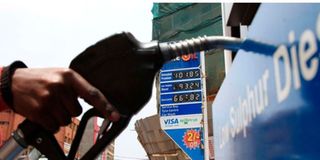Slight relief for motorists as fuel prices fall

An attendant at a Nyeri petrol station prepares to fill up a car in August 2020.
Kenyans have been given a slight relief as the energy regulator has marginally reduced fuel prices at the pump from midnight.
The Energy and Petroleum Regulatory Authority (Epra) has reduced the price of petrol by Sh0.66 per litre and diesel by Sh1.12 per litre for the fuel pricing cycle from June 15 to July 14.
However, households will pay more for kerosene after Epra increased the pump price of the product by Sh0.35 per litre.
The price cut means that a litre of petrol will sell for Sh182.04 in Nairobi, down from Sh182.7, while diesel will sell for Sh167.28, down from Sh168.4.
However, a litre of kerosene will now cost Sh161.48, up from Sh161.13.
Motorists in Mombasa will pay Sh179.2 for petrol, Sh164.45 for diesel and Sh158.65 for kerosene while those in Nakuru will pay Sh181.18, Sh166.78 and Sh161.01 for the three products respectively.
"Taking into account the weighted average cost of imported refined petroleum products, the changes in the maximum allowable pump prices of petroleum products in Nairobi are as follows: premium and diesel will decrease by Sh0.66 and Sh1.12 per litre respectively while kerosene will increase by Sh0.35 per litre," said Daniel Kiptoo, Epra director general.
The price cut follows a 4.57 per cent drop in the free-on-board price of Murban crude oil from $83.36 (Sh11,645) per barrel to $79.55 (Sh11,113) in May.
The latest downward adjustment in fuel prices will come as a welcome relief to Kenyans who have been paying record high prices for fuel, which has been one of the main drivers of inflation over the past month.
Last month, Epra increased the retail price of petrol by Sh3.4 per litre, diesel by Sh6.4 and kerosene by Sh15.19 per litre after removing all subsidies on the commodity.
Despite unleashing full market prices on consumers, the World Bank recently called on President William Ruto to withdraw remaining subsidies to control government spending.
The government has been subsidising key inputs, particularly fuel, electricity, fertiliser and, for a brief period last year, maize meal, in a bid to lower prices and reduce production costs.
High commodity prices pushed inflation up to 8 per cent in May from 7.9 per cent in April, according to the Kenya National Bureau of Statistics (KNBS).
During the month, the year-on-year price changes for food, energy and transport, which account for about 57 per cent of household budgets, were 10.2 per cent, 9.7 per cent and 10.1 per cent respectively.





